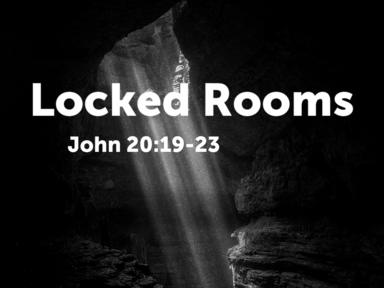Locked Rooms

The disciples had a reason to be locked in a room, afraid.
Our reasons to live in fear are also—at times—valid.
How often the contemporary church finds itself behind closed doors, fearful and ineffectual, living on the wrong side of the resurrection. The problems are so vast and the enemy so overwhelming and all the talk about Jesus seems futile. What can be done but hide in the sanctuary discussing how desperate the situation is?
Jesus doesn’t admonish the disciples for their lack of faith but meets them in their fear.
Jesus meets us in the midst of our fear, doubt, and confusion too.
message both of forgiveness and warning, of faith that confronts and conquers doubt, and of hope that overcomes fear (verse 19). We go out, in fact, as people of new creation
We new-creation people are to fill our lungs with Jesus’ powerful breath, to fill our minds with the truth of his resurrection, to fill our hearts with love for him and his world, and to go out, not knowing where we shall go or what we shall do, but only that a new day has begun which will never end. We are to remind ourselves, again and again, that the love which was shown on the cross (revealed once more here in the mark of the nails, verse 20) is the same powerful love that will carry us forward, through all the suffering and sorrow that we too will meet, to the point where not only we, but a great company that nobody could count, will say ‘My Lord and my God’. There are, as John says, many other things that he could have written in this book. But this is enough: enough for us, and for the world, to believe, to find life. Easter life. Here and now.